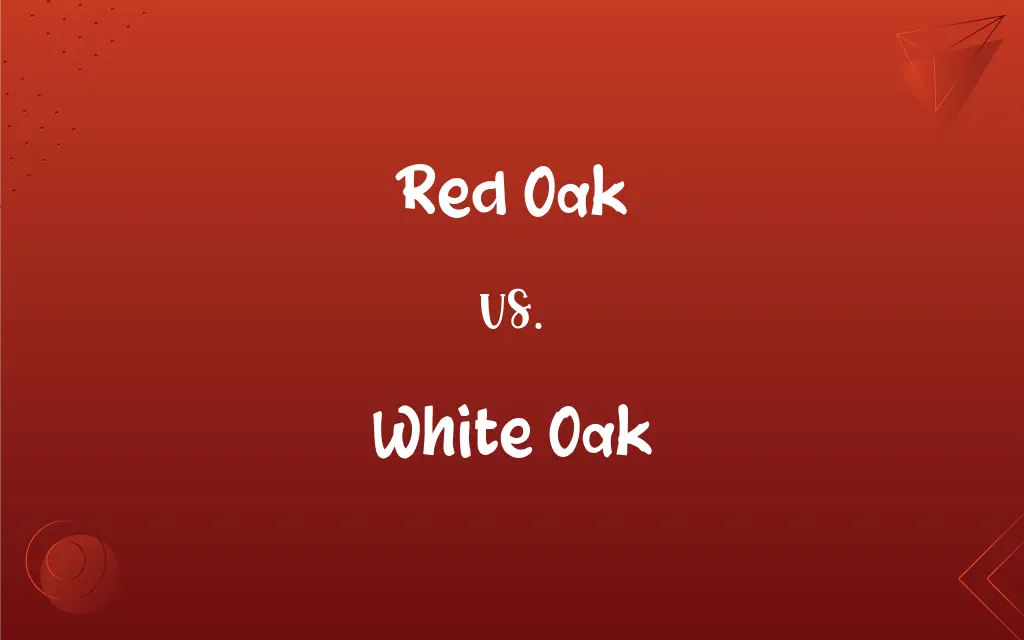Red Oak vs. White Oak: What's the Difference?
Edited by Janet White || By Harlon Moss || Updated on October 25, 2023
Red oak has pointed leaf lobes and porous grain, while white oak has rounded leaf lobes and a closed grain structure.

Key Differences
Red oak and white oak are two distinct species of oak trees. The red oak tends to have leaves with sharp, pointed lobes, while the white oak's leaves feature rounded lobes.
In terms of wood grain, red oak has a more open, porous grain, making it less resistant to water. Conversely, white oak boasts a tighter, closed grain structure, giving it superior water resistance.
From a color perspective, red oak typically presents a reddish-brown hue, whereas white oak tends to have a lighter, more beige or grayish tone, although there can be exceptions.
When considering durability, both red oak and white oak are robust and sturdy, but white oak often has a slight edge in hardness, making it more durable for certain applications.
In terms of usage, red oak is commonly utilized for furniture, cabinets, and flooring. White oak, with its water resistance, finds applications in boat building, outdoor furniture, and barrel-making for wines and spirits.
ADVERTISEMENT
Comparison Chart
Leaf Lobes
Pointed
Rounded
Grain Structure
Open, porous
Tight, closed
Color
Reddish-brown
Beige or grayish
Durability
Sturdy, slightly less hard than white oak
Extremely durable, often harder than red oak
Common Usage
Furniture, cabinets, flooring
Boat building, outdoor furniture, barrel-making
ADVERTISEMENT
Red Oak and White Oak Definitions
Red Oak
Red oak grows prominently in the Eastern United States.
On our East Coast road trip, we saw vast forests of red oak.
White Oak
White oak is an oak species distinguished by its rounded leaf lobes.
The white oak outside the library has been standing for over a century.
Red Oak
Red oak is a species of oak tree known for its pointed leaf lobes.
The red oak in our yard turns a brilliant shade in autumn.
White Oak
The hue of white oak wood leans towards beige or grayish tones.
The kitchen island made of white oak complements our modern aesthetic.
Red Oak
Red oak wood has a distinctive reddish-brown color.
We chose red oak for our dining table because of its rich hue.
White Oak
White oak wood is often used in crafting barrels for aging spirits.
The whiskey matured in a white oak barrel has a distinct flavor profile.
Red Oak
Red oak is commonly used in interior furnishings.
Many carpenters prefer red oak for crafting cabinets and chairs.
White Oak
White oak is highly valued in boat building due to its water resistance.
Many shipbuilders trust white oak for constructing durable vessels.
Red Oak
Red oak timber is characterized by its open and porous grain.
The red oak floorboards have a unique texture due to their grain pattern.
White Oak
White oak wood has a tight, closed grain structure.
The white oak deck remains durable, even after years of rain exposure.
FAQs
How is white oak different from red oak in appearance?
White oak has rounded leaf lobes and a beige or grayish wood hue, unlike red oak's pointed lobes and reddish-brown hue.
What is red oak?
Red oak is a species of oak tree known for its pointed leaf lobes and reddish-brown wood.
Are white oak barrels commonly used in winemaking?
Yes, white oak barrels are prized in winemaking and spirit aging because of the unique flavors they impart.
Can both red oak and white oak be used for flooring?
Yes, both types are popular for flooring, but their different grains and colors offer varied aesthetics.
Which oak is more water-resistant?
White oak, due to its tight and closed grain structure, is more water-resistant than red oak.
Can both red oak and white oak be stained?
Yes, both types can be stained, but due to their grain differences, they might absorb stain differently.
Which oak is harder and more durable?
White oak is often considered harder and slightly more durable than red oak.
Why is white oak used in boat building?
White oak's water resistance and durability make it ideal for boat construction.
Is the wood of red oak actually red?
Not exactly; red oak wood has a reddish-brown hue, but it's not distinctly red.
Is white oak more expensive than red oak?
Often, yes. White oak's superior water resistance and durability can make it pricier.
Why is white oak popular for whiskey barrels?
White oak's tight grain structure allows for controlled interaction between the wood and spirit, enhancing flavor.
How can the grain structure impact the use of the wood?
Grain structure affects properties like water resistance and appearance, influencing the wood's suitability for various applications.
Where are red oaks commonly found?
Red oaks are predominantly found in the Eastern United States.
Which oak would be better for outdoor furniture?
White oak, due to its water-resistant properties, is typically better suited for outdoor applications.
Are red oak and white oak the only oak species?
No, there are numerous oak species, but red and white oaks are among the most well-known.
How fast do red oaks grow?
Red oaks have a moderate growth rate and can add 1-2 feet annually.
Are there any pests that particularly affect white oak?
Like many trees, white oak can be susceptible to pests like oak wilt or the gypsy moth.
How long can red oak trees live?
With proper conditions, red oak trees can live several hundred years.
How can I tell the difference between red oak and white oak leaves?
Red oak leaves have pointed lobes, while white oak leaves have rounded lobes.
About Author
Written by
Harlon MossHarlon is a seasoned quality moderator and accomplished content writer for Difference Wiki. An alumnus of the prestigious University of California, he earned his degree in Computer Science. Leveraging his academic background, Harlon brings a meticulous and informed perspective to his work, ensuring content accuracy and excellence.
Edited by
Janet WhiteJanet White has been an esteemed writer and blogger for Difference Wiki. Holding a Master's degree in Science and Medical Journalism from the prestigious Boston University, she has consistently demonstrated her expertise and passion for her field. When she's not immersed in her work, Janet relishes her time exercising, delving into a good book, and cherishing moments with friends and family.































































